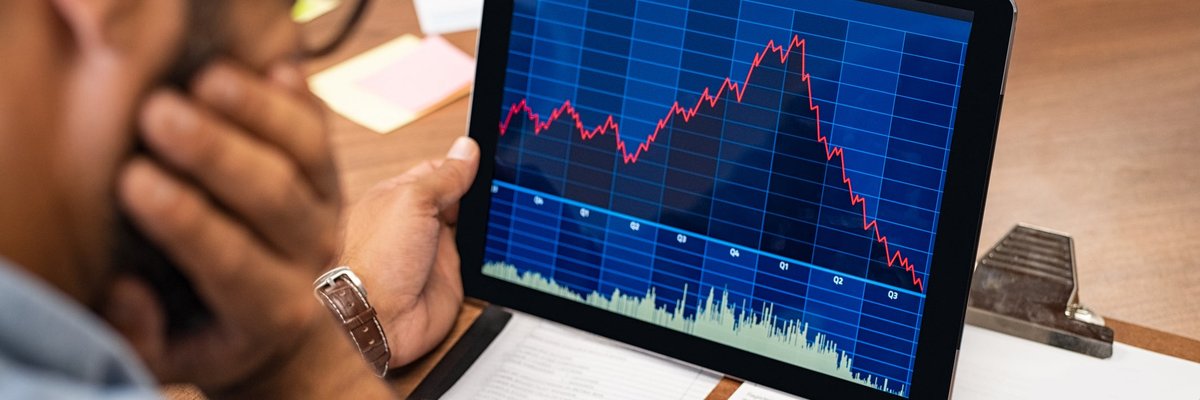Bitcoin Is Down 7% This Week. Should You Buy?
KEY POINTS
- Bitcoin's price was starting to show signs of recovery, but it has fallen in recent days.
- Fear over the Federal Reserve's economic tightening measures has impacted crypto prices.
- Dips can be a buying opportunity, but a lot depends on your financial situation.
Talk of a crypto spring may have been overly optimistic.
Cryptocurrency prices trended upward for much of March, erasing a lot of the year's losses. The total market cap moved above the $2 trillion mark and the price of Bitcoin (BTC) pushed above $47,000 for the first time since January.
However, the lead crypto hasn't been able to sustain those gains and at time of writing was down 7% on the week, according to CoinGecko. It fell below $43,000 yesterday, but is pushing up a little again today. The fear and greed index -- a measure of crypto sentiment -- has slipped back into "fear" territory.
What's impacting Bitcoin's price?
These types of price fluctuations are normal for Bitcoin, and a number of factors are stopping it from building momentum.
1. Fear over further economic tightening
The Federal Reserve's moves to curb inflation and shrink its balance sheet have had a big impact on the crypto market. They make riskier assets like cryptocurrency less appealing and push prices down. Lower interest rates and other hawkish measures mean investors will likely be more risk averse for some time to come.
2. Concern over regulatory moves
Several authorities around the world have announced potential regulatory steps in recent weeks. The European Parliament wants tougher traceability rules in an effort to crack down on money laundering. In the U.S, lawmakers are discussing tougher stablecoin rules and the Securities and Exchange Commission said it would work more closely with the Commodity Futures Trading Commission.
In the long run, regulatory clarity could be good for the cryptocurrency industry. But a lot depends on how stringent any new measures are. Crypto enthusiasts want regulators to find ways to protect investors without hampering innovation -- which is a difficult circle to square.
3. Ongoing crisis in Russia
Russia's invasion of Ukraine prompted various countries to impose strict economic sanctions. The impact of sanctions is most severe in Russia, and economists now predict a debt default. But it has also had an impact on the global economy, sparking fears of a global recession. So far, the conflict has had a mixed impact on crypto. But wider economic and geopolitical uncertainty will continue to affect the price of Bitcoin and other cryptocurrencies.
Should you buy?
It's common to see crypto commentators urging people to "buy the dip" when prices drop. The trouble is that the rush to buy when prices are low can mean people spend money they can't afford to lose, or panic buy without fully researching the asset.
READ MORE: Best Cryptocurrency Apps and Exchanges
Plus, while buying low and selling high sounds like a sensible investment philosophy in theory, it can be difficult to achieve in practice. It is almost impossible to call the lows or highs. Bitcoin may fall even further tomorrow, it may begin to trend back upward, or it may stagnate at this price level for a little while. This is why long-term investors tend to be better at building wealth than short-term traders.
Nonetheless, if you've been waiting for the right time to buy Bitcoin and have cash put aside, it may make sense to act. Here are some questions to consider:
- Do you have cash to spare? The golden rule of crypto investing is to only spend money you can live without. That way if the market crashes, it will be disappointing but not devastating.
- Are you on top of your other financial goals? Don't prioritize high-risk investments like crypto over things like paying down debt or putting aside an emergency fund.
- Have you researched Bitcoin? As with any investment, make sure you understand what you're buying. Look at the factors that might impact its performance over time, how blockchain technology works, and try to understand what utility Bitcoin has.
- Do you understand the risks involved? Bitcoin may have made some people millionaires or even billionaires, but plenty of others have lost money on their investments. This is an extremely volatile asset and there are a lot of unknowns that could cause it to collapse completely.
- Is your investment part of a bigger plan? Think about how crypto fits into your wider investment portfolio and what you're trying to achieve. Many experts advise that only a small percentage of your portfolio should be in crypto, especially for new investors.
All in all, a price drop may be a good opportunity to pick up some (more) cryptocurrency. But your financial situation, financial goals, and crypto knowledge are as important as Bitcoin's price -- if not more so.
Our Research Expert
We're firm believers in the Golden Rule, which is why editorial opinions are ours alone and have not been previously reviewed, approved, or endorsed by included advertisers. Motley Fool Money does not cover all offers on the market. Motley Fool Money is 100% owned and operated by The Motley Fool. Our knowledgeable team of personal finance editors and analysts are employed by The Motley Fool and held to the same set of publishing standards and editorial integrity while maintaining professional separation from the analysts and editors on other Motley Fool brands. Terms may apply to offers listed on this page.



